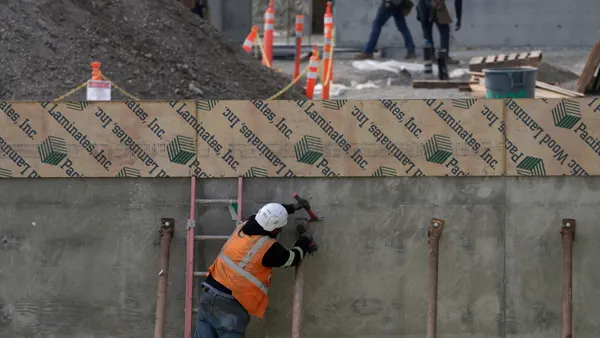Dive Brief:
- Recruitment of women into New York City union apprenticeship programs is up 50%, according to a Commercial Observer op-ed piece penned by Kathleen Culhane, president of Nontraditional Employment for Women (NEW), and Gary LaBarbera, president of the Building and Construction Trades Council of Greater New York (BCTC).
- Each of BCTC’s apprenticeship programs have committed to recruiting up to 15% of their enrollees from NEW’s pre-apprenticeship training programs. The officials claim that the partnership between the two organizations has increased the number of women in New York City trades by 20% since 2006.
- In the last 10 years, more than 1,500 women have been placed in BCTC apprenticeships, where they can earn more than $18.50 an hour in starting wages and increase their pay to more than $60 per hour once they’ve completed their apprenticeship training.
Dive Insight:
Construction industry recruitment in the U.S. has seen efforts targeting minority groups, veterans, women and other underrepresented demographics, especially given the overall dwindling pool of skilled workers.
Yet, despite these efforts, the overall percentage of women in the industry hasn’t changed much during the last few decades, hovering somewhere between 9% and 10% since 1996. The latest Bureau of Labor Statistics data has female participation within the construction industry at 9.9%.
But of those numbers, about 8.3 million women altogether, not even 3.5% were working in field-related occupations within the industry. Building inspectors (14%), painters (7.2%) and helpers (5.6%) had the highest number of women in 2018, but the percentage of women in high-demand trades like carpentry, drywall hanging and electrical work were typically between 1.9% and 3.7%.
One area where the percentage of women is seeing relatively healthy growth is in the category of construction managers. That share has climbed to 7.7% in 2018 from 5.9% in 2003.
Obviously, then, adding women to the job roster hasn’t been easy. Women, like many other potential construction workers these days, don’t see forging a career in the trades as a likely option. Some women face additional hurdles, though, because the atmosphere they encounter in the field can sometimes be a bit hostile. Last year, for instance, New York carpenter Linda Dugue sued her former employer, claiming that the company treated her and other female employees unfairly by not offering them the same opportunities as their male counterparts, limiting their overtime, throwing up roadblocks to career advancement and allowing discriminatory behavior against women.










